What happens at safari lodges when the guests don’t come?
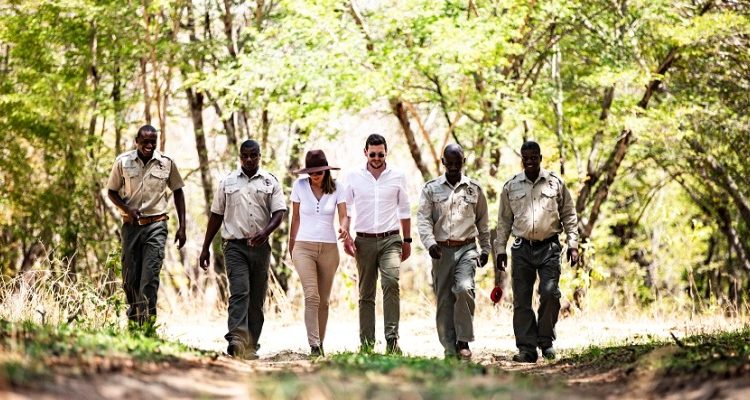
With travellers limited to navigating memory cards rather than new African horizons, we’ve been in touch with a few of our favourite camps to find out how they are coping on the ground. Money will undoubtedly be tight over the coming months so they are right behind the #PostponeDontCancel message. However, we were delighted to find the majority upbeat and keeping busy, with many wonderful stories of how they are finding ways to turn the current hiatus in the travel industry to their advantage. Below are some highlights of the amazing work our inspirational partners in Africa are getting up to, whilst they take a break from making our guests’ travel dreams come true.
HONEYBEES GUARDING TREES, SOUTH AFRCA
Samara Karoo Lodge is a rewilding pioneer, turning some of South Africa’s more arid and marginal farmland into protected areas and reintroducing native flora and wildlife to the land. Ultimately, the aim is to open up a vast wildlife corridor for elephants to traverse their ancient migratory route from the Karoo to the coast. During this time of concern for the wildlife’s safety, Samara is turning to nature’s smallest guards, a widely used but little known weapon in the conservation arsenal; the honeybee. Many animals, especially elephants, will avoid beehives because of the danger of being stung. At Samara, this will be put to use to protect iconic trees on the reserve, including a magnificent 800-year-old shepherd tree, from elephant bulls and other wildlife. As an added benefit, the beehives will produce honey from the indigenous Karoo flora which will be used in Samara’s Karoo Kitchen and sold in the lodge shop as part of a staff profit-sharing scheme.
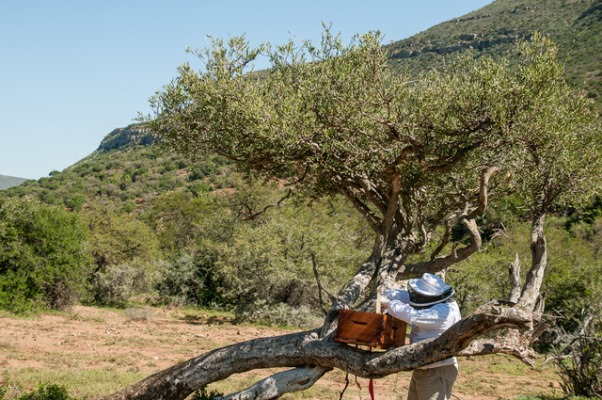
Honeybees used to deter elephants from damaging trees at Samara
SCHOOL FOR CHILDREN AND HORSES, KENYA
At Sosian in Kenya, home schooling is the name of the game for Charlotte and Shaun who run the ranch and stables, with the responsibility for the continued education of two young boys and 30 horses. Schooling is essential for a horse to learn how to be well balanced and responsive – vital for a safari steed – and involves a range of exercises from simple movements on 10 and 20 metre circles, to grid work and gymnastics over jumps. Younger horses are also being introduced to the saddle and a rider for the first time, with close proximity to wildlife the next challenge after that. Schooling for two young boys in the bush also involves getting close to wildlife as bird identification, fishing and cattle herding top the agenda. With horse riding, game drives and stargazing, all in stunning surroundings, this is a timetable we think would be easier to get our children excited about.
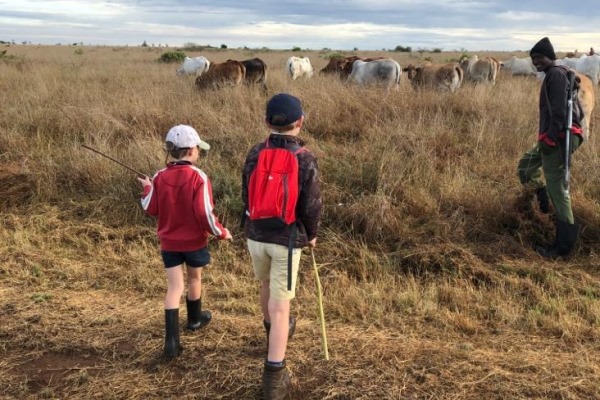
Home schooling at Sosian, with cattle herding on the curriculum!
RUBBISH COLLECTING, VICTORIA FALLS, ZAMBIA
The Tongabezi staff have replaced looking after guests with looking after their local wild spaces. Nearby Mosi Oa Tunya National Park is one of the best places in Zambia to see white rhino, but sadly has a rather necessary highway from Botswana to Zambia running straight through it. With empty packaging being thrown from vehicles a lot of rubbish has gathered in an otherwise pristine and highly valued wild space. So team Tongabezi took to the fresh air for a major tidy up. The result of putting their extra hours towards this project is a hugely positive difference to a wildlife area for which they aren’t responsible, but have chosen to care for.
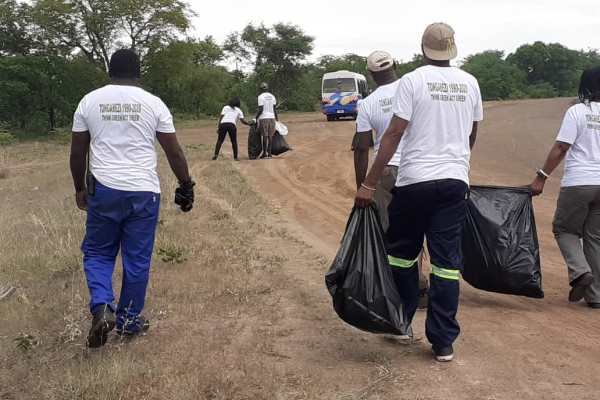
Team Tongabezi collecting litter in Mosi Oa Tunya National Park
NEW STAFF, GRANTS AND CONSERVATION IN KAFUE NATIONAL PARK, ZAMBIA
Ty and Phil, founders of Jeffrey and McKeith Safaris and Musekese Conservation, have prioritised the continuation of both staff employment and conservation efforts in Zambia’s Kafue National Park. Staff are busy in camp with maintenance and rebuilding , ready to welcome guests back once travel is possible. Two new members have been added to the team and they will focus on conservation research, grant procurement and proposal writing. Last year 70% of Musekese Conservation’s operating costs were covered by tourism and the hope is that with some key grants they will be able to continue the conservation work in Kafue National Park throughout 2020.
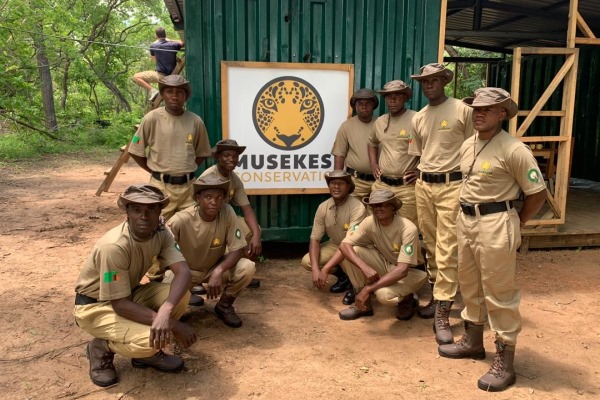
The Musekese Conservation team
PROTECTING THE MOUNTAIN GORILLAS, UGANDA
One species that perhaps needs more protection during this time than any other is the endangered mountain gorilla, which may be susceptible to coronavirus. Tourism is the primary economic driver for their conservation but whilst the risk posed by the virus remains, the Uganda Wildlife Authority has taken the decision to suspend primate tourism in its wildlife areas. Dr Gladys Kalrema-Zikusoka specialises in animal-human health and champions the link between health education and successfully protecting wildlife. Her company, Conservation Through Public Health, has led the way in training park staff, including wardens, head rangers and head trackers, in how to manage and prevent COVID-19 spreading amongst people and from people to gorillas. Gladys’ work, including a study highlighting the importance of adhering to the 7m distance rule when observing gorillas, will safeguard the gorillas, ensuring travellers will return to lodges such as Volcanoes’ Bwindi Lodge when possible again. A portion of any stay at one of Volcanoes Safaris’ lodges in Uganda also goes towards funding community projects, such as supporting Batwa children going to school at Gahinga, the Bwindi bar training school for local youngsters working in hospitality, conserving the Kyambura Gorge Buffer zone and providing water tanks for local householders in Virunga.
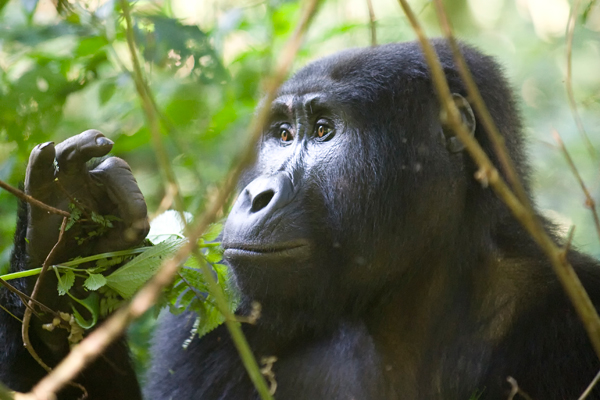
Endangered mountain gorilla in Bwindi Impenetrable Forest
FUNDS DIVERTED TO ANTI-POACHING IN HWANGWE, ZIMBABWE
Over in Zimbabwe, Wilderness Safaris has diverted funds originally intended for accommodation to cover anti-poaching patrols by the Scorpion Unit in Hwange National Park. The money will allow the unit to continue work for the next eight months and replaces funds usually provided through tourism. Wilderness Safaris has been involved in supporting Hwange’s Scorpion Anti-Poaching Unit since 2012, taking over the operations of the unit in 2015. In 2019 the Scorpion team covered more than 2,203 km of ground through 273 foot patrols (an increase of 44% from 2018), removed 203 snares and made five arrests. Given Hwange’s vast size, it is a constant challenge to cover this large area but the unit’s work has had a notable impact on the population and diversity of species.
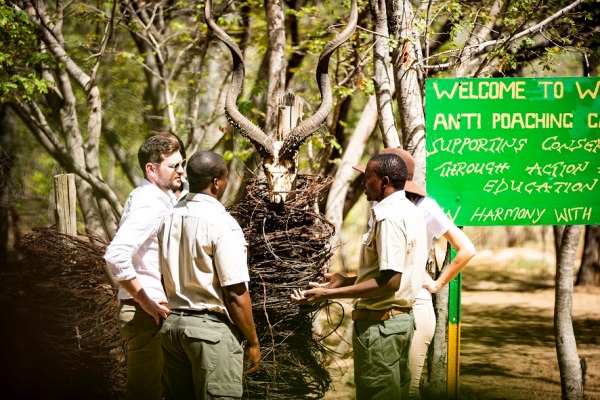
Guests staying at Wilderness Safaris’ Linkwasha Camp with SAPU rangers
RHINO PATROLS ON HORSES, SOUTH AFRICA
At Ant’s Reserve in South Africa, where one of the most exciting activities is encountering white rhino on horseback, the team quickly realised that the lockdown would make them a particularly soft target for poachers. In just 48 hours, reports emerged of seven rhinos being poached in two different South African reserves, so lodge owner Ant Baber and his staff are on high alert. Many of the rangers that form part of the 24 hour guard on the Ant’s Reserve chose to spend lockdown at Ant’s, and the team are doubling up on the security by using the horses to make anti-poaching patrols, keeping them fit and healthy at the same time. They are even, when moonlight allows, heading out on night patrols on horseback.
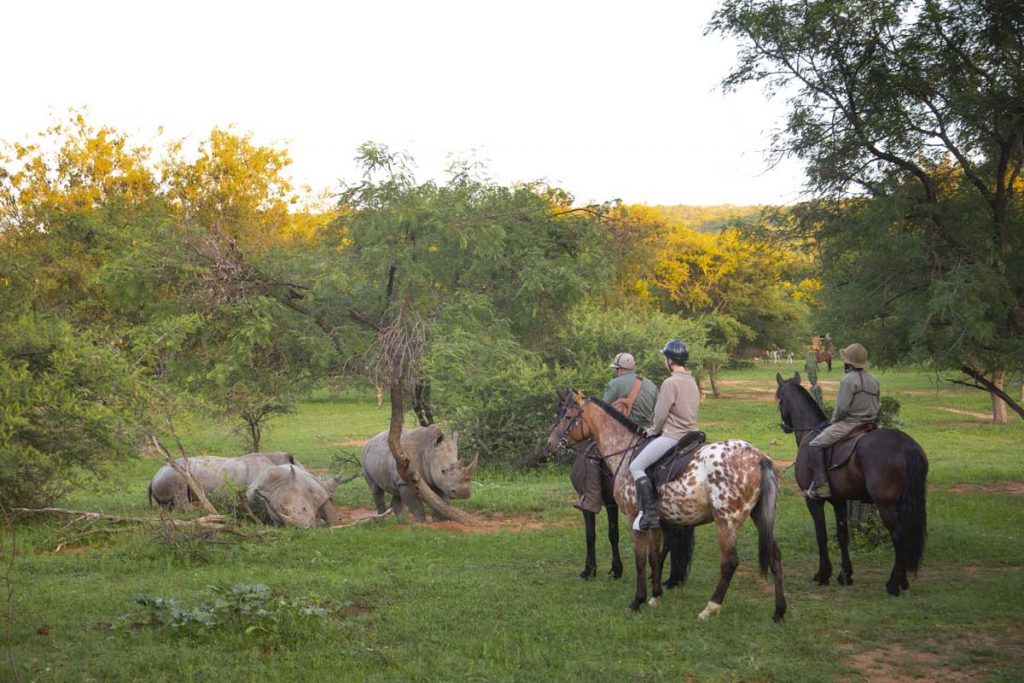
Horses and rhino at Ant’s Nest
What next?
If the work these camps are carrying out has inspired you to travel, we would be delighted to help you plan a holiday, or answer any questions about our safaris. Our team of experts have travelled widely throughout Africa. They can offer expert advice on every type of safari from family and beach holidays to riding and primate safaris. If you would like to talk to someone who has been there and done it, please just send us an email or give us a call.
Sterling and Amazing work! THANK YOU ALL
Comforting to know that wonderful people are still caring for wildlife!
Stay safe all of you❤️